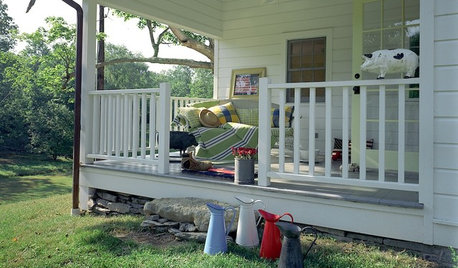Does anyone decide to not pull permits?
texaspenny
12 years ago
Featured Answer
Sort by:Oldest
Comments (64)
rocketmomkd
12 years agopalimpsest
12 years agoRelated Discussions
Who 'checks things' if your county does not do permits
Comments (12)As if the lack of permits & inspections is not bad enough, in some regions there is absolutely no required certification for some contractors. By example; In the state of Ohio a Commercial & Residential Plumber is required to complete a 4 year state approved apprenticeship and take a written exam to receive a "Plumbers License", but if one wants to work solely on single family or multi-family residential structures that do not exceed 3 stories in height or have more than 4 living units they can get a limited "Residential Plumbing License" directly from the county or municipality where they intend to work. To make matters even worse, in many counties and municipalities they simply do not have a licensing procedure whatsoever, and sadly, in those areas that do require a "Residential License" the procedure is at best a joke. In many cities one can go to the courthouse and declare they want to be a "Residential Plumber". The will then be required to produce a state tax number, a liability insurance policy and if they intend to hire 4 or more people they must have a workmans comp insurance policy, then pay a flat fee in the order of $125/annum and voila', they are a "Residential Plumber". The truth of the matter is that many of those people have absolutely no prior experience or training and most wouldn't know the plumbing code from the morse code, but who cares, the city doesn't require any permits or inspections anyway. Many cities have adopted a permit program, but are they really intent on checking your home for proper installation or safety? The answer here is NO. If the truth was told they have adopted permits and inspections for two reasons: 1. The permits & Inspection fees are a cash cow for the city. 2. When your new construction, remodel or addition is completed the inspector can flag the tax assessors office to come and upgrade your assessment for tax purposes. In recent years, as a result of the shake up in the banking industry in regions where they do not have strong code enforcement many banks have now hired their own code inspectors and they will not write a mortgage until the structure is signed off by their inspector. If you live in a region where they do not have good code enforcement I would suggest you discuss your concern with your banker and they may have an inspector that will work with you. The downside of using the banks inspector is that many GC's and subs will argue that the banks inspector does not have the authority to require changes. To that I would respond, if your work doesn't pass the bank inspector, I get no mortgage, and if I get no mortgage you get no money, simple as that....See MoreDoes a MWBC Count as 1 or 2 Added Circuits on Permit?
Comments (4)Thanks for the input. I sent an email to the local Labor & Industries office that handles electrical inspections, etc. and asked the question. The response was: a MWBC counts as two circuits and a 240V circuit counts as one. This is how I originally specified the circuits to be added or modified on the permit, so it should be OK....See MoreDoes anyone have Amerock Vineyard knobs/pulls?
Comments (0)I am s-t-i-l-l trying to decide what deco. hardware to use on my refaced cabinets. Our previous cabinets had cutouts on the underside/upperside of the doors/drawers so I never had to make this decision. It seems like it is taking me longer to decide which pulls/knobs will looks best than planning the new doors, countertop etc. I have it narrowed down to the pewter,satin nickel, weathered nickel and iron side of the color wheel. If no one has these pulls I guess I will have to order a piece of each color to see which will look best. The pattern will be between Vineyard, Inspirations or a plain, simple style. Thank you. Jane...See MoreRTRM: The Sage Continues–No Permits pulled by Seller on Exterior adds
Comments (31)An update: We are DIYers, I'm capable of a lot of things. In-fact, I just pulled up the vinyl flooring in our RV and replaced some worn sub floor. Then repaired the vinyl. I brought the tools to the marriage..DH brought the nerdy tech :D We are fine taking on reasonable projects. I research, ask questions, and practice before going crazy. My background is in making technical drawings for wood/metal/acrylic fabrication (anything from something small to structures over 50 ft tall), so my brain is they type that just likes to know how things work. I'm also an artist of sorts. My creations are edible (cakes), but I am methodical and pay attention to detail. My mom is an amazing woman and taught me how to do a lot of things, but mostly she taught me to research, follow instructions and to do things right- which is probably where my frustration when people don't follow rules comes from! I follow best practice when I can, and over engineer when I can't. My dad funded the projects and provided heavy lifting.. let's just say I one time watched him cut the same piece 4 times over for LVP install. But he eventually got it and to his defense, it was cut around an angle and heating floor vent.:D I was just sent over the pool permits and plans, as well as the permit on the patio, and for good measure the fence. Everything has passed inspections. The shed and extended driveway are the only things left. As most of you pointed out, they are pretty "worthless" on paper. They are in good working order. They appear to be free from defect and in good shape per our independent inspector. After seeking outside council, reading on Houzz, talking to our parents, grandparents, other home buyers, and the city, we have decided to take a concession from the seller to negate our risk and we will remedy the issues at some point. In the mean time we will enjoy these features of the home for how ever long we get to. IF/When the time comes where we must remove/modify, we will. I have no problem with this now. I know me, I know what to expect. I don't like surprises (Diamonds, Lottery Winnings, Chocolate and Flowers are exceptions). I know those of you who think I should have ran without further investigation may think I'm out of my mind, I still appreciate your comments. You helped me look at all angles. But I had to look at the whole picture-- and you know, include my husband in the decision. No home is perfect. No home will have no issues. No home will ever be built to 100% of my satisfaction (even if we built new). At least with this home, I feel like we have a good idea of what is wrong-- I know things will still pop up and surprise us :D Thank you to those who said it's not the end of the world...those who thought it was no issue at all, and those who said to proceed cautiously. I know I can't please everyone on the forums, but I am grateful for the general feeling of "we want to help," and I want to let you know I weighed everything heavily and feel content with our decision. Where we are ending up is FAR better with the guidance of Houzz than where we started 9 months ago an first time buyers. Sometimes the advice is hard to hear, but I know we need to hear it. Thanks again and Cheers!...See Morehlove
12 years agoCircus Peanut
12 years agoCEFreeman
12 years agonorthcarolina
12 years agoCEFreeman
12 years agoathomesewing
12 years agodesertsteph
12 years agoMizinformation
12 years agoMizinformation
12 years agojjnv
12 years agowildchild
12 years agodseng
12 years agocarybk
12 years agomarcolo
12 years agokaysd
12 years agosenator13
12 years agobrickeyee
12 years agomarcolo
12 years agomjsee
12 years agoa2gemini
12 years agoMDBmom
12 years agojoaniepoanie
12 years agotexaspenny
12 years agojalsy6
12 years agomarcolo
12 years agoa2gemini
12 years agoUser
12 years agoRachiele Custom Sinks
12 years agoCEFreeman
12 years agobrickeyee
12 years agomarcolo
12 years agodrbeanie2000
12 years agolannie59
12 years agoangie_diy
12 years agojoaniepoanie
12 years agoFori
12 years agomarcolo
12 years agobrickeyee
12 years agoangie_diy
12 years agosas95
12 years agoFori
12 years agoMizinformation
12 years agobabushka_cat
12 years agojoaniepoanie
12 years agoangie_diy
12 years agomarcolo
12 years agoUser
12 years agolavender_lass
12 years ago
Related Stories

CONTRACTOR TIPSBuilding Permits: When a Permit Is Required and When It's Not
In this article, the first in a series exploring permit processes and requirements, learn why and when you might need one
Full Story
CONTRACTOR TIPSBuilding Permits: The Submittal Process
In part 2 of our series examining the building permit process, learn what to do and expect as you seek approval for your project
Full Story
CONTRACTOR TIPSYour Complete Guide to Building Permits
Learn about permit requirements, the submittal process, final inspection and more
Full Story
INSIDE HOUZZHow Much Does a Remodel Cost, and How Long Does It Take?
The 2016 Houzz & Home survey asked 120,000 Houzzers about their renovation projects. Here’s what they said
Full Story
KITCHEN DESIGNThe Cure for Houzz Envy: Kitchen Touches Anyone Can Do
Take your kitchen up a notch even if it will never reach top-of-the-line, with these cheap and easy decorating ideas
Full Story
KITCHEN DESIGN6 Clever Kitchen Storage Ideas Anyone Can Use
No pantry, small kitchen, cabinet shortage ... whatever your storage or organizing dilemma, one of these ideas can help
Full Story
DECORATING GUIDES7 Bedroom Styling Tricks Anyone Can Do
Short on time or money? You can spruce up your bedroom quickly and easily with these tips
Full Story
LIFEHow to Decide on a New Town
These considerations will help you evaluate a region and a neighborhood, so you can make the right move
Full Story
CONTRACTOR TIPSBuilding Permits: 10 Critical Code Requirements for Every Project
In Part 3 of our series examining the building permit process, we highlight 10 code requirements you should never ignore
Full Story
CONTRACTOR TIPSBuilding Permits: What to Know About Green Building and Energy Codes
In Part 4 of our series examining the residential permit process, we review typical green building and energy code requirements
Full Story





cakelly1226